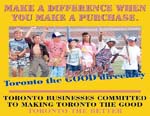

By Dan Margolis, People's Weekly World Newspaper, ILCA Associate Member
NEW YORK -- The people of this city have plunged into the growing international fight against Wal-Mart's unfair business practices by forming the "Wal-Mart Free NYC Coalition." This comes in response to the department store chain's announced plans to build its first city store in Rego Park, Queens. On Jan. 6, the coalition held a rally against Wal-Mart's expansion plans, and then went into City Hall where dozens of speakers spoke at a City Council committee hearing on so-called "big box" stores. Nearly everyone who spoke demanded that the City Council do something to stop the store from being built.
"The true legacy of Wal-Mart isn't lower prices," said Central Labor Council (CLC) President Brian McLaughlin, who is also a state assemblyman (D-Flushing). "The true legacy of Wal-Mart is lower living standards for hard-working Americans and those overseas." McLaughlin asked for a moratorium on all big box stores until a complete study on how they affect surrounding neighborhoods could be done.
The issue is shaping up to be a factor in this year's mayoral elections. Republican Mayor Michael Bloomberg openly supports the company, while a number of the Democratic contenders have already taken positions against it.
The coalition, which is still in formation, was established by the CLC and local affiliates of the food and commercial workers union and the retail, wholesale, and department store workers union. It includes other unions, elected officials, and community and religious groups.
According to a study done by staff of the U.S. House of Representatives Education and the Workforce Committee, the average Wal-Mart store employing 200 people costs taxpayers $420,750 per year. This is because the wages and benefits that the company pays are so low that most of its workers fall into the category of "working poor" -- people who work but need government assistance to survive. This fact stands in stark contrast to Wal-Mart's claims that it will benefit any community into which it moves.
In addition, studies show that for every two jobs created by one of their new stores, three community jobs are lost -- and the two new jobs pay significantly lower wages.
The AFL-CIO says that, while on average, 66 percent of workers at large U.S. companies get health insurance through their job, fewer than half of Wal-Mart's workers do. The AFL-CIO also states that the staunchly anti-union Wal-Mart pays its full time workers an average of only $9.64 per hour, and that "full-time" workers often work as little as 34 hours per week. This puts these workers below the federal poverty line for a family of four.
The coalition argues that Wal-Mart's track record proves that it will ruin the community it is planning to move into. Studies show that mom-and-pop businesses, which in New York City are often immigrant-owned, are typically driven out of business when Wal-Mart moves in. "No local, responsible merchant could compete with Wal-Mart and their illegal, exploitative operations," Jean Kim of the CLC told the World.
The list of Wal-Mart's misdeeds is long, and includes charges of open racism and sexism, a poor environmental record, connections to sweatshops abroad, and the practice of locking in overnight workers. Lawsuits against the company are pending all over the country.
"Everyone has a stake in the struggle against Wal-Mart," said Kim. "People concerned with workers' rights, women's rights, civil rights, immigrant rights, labor rights, health care rights, and so on, all have a stake in this."
Wal-Mart has recently been dealt some setbacks. It was forced to abandon plans to open a store in Ingleside Calif., and Chicago after a fight back by labor and and residents. Community protests against the stores are becoming more common. Its image has been so tarnished by word-of-mouth and grassroots organizing that the company, which is normally very secretive, has been forced to organize a multi-million dollar public relations campaign in an attempt to clear their name.
Kim said that the struggle against Wal-Mart's practices is winnable: "We are going against a retail giant with unlimited resources and funds, but we can win by community and grassroots organizing."